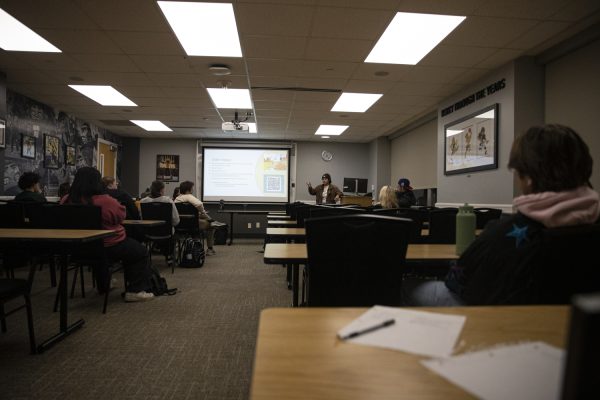Editorial | Who should be the next leader at the UI
After reviewing the impressive candidates for the next head Hawk, the Daily Iowan Editorial Board writes that Barbara Wilson of U. Illinois and Wendy Hensel of Georgia State have the most extensive academic administrative experience and excellent visions for the UI.
April 25, 2021
The next leader at the University of Iowa will face an unmatched number of headwinds in higher education. From COVID-19 financial losses to diversity, equity, and inclusion initiatives, it’s important that whoever is chosen has the background and confidence to address these issues and successfully lead the university.
After reviewing the four finalists, The Daily Iowan Editorial Board believes that Wendy Hensel or Barbara Wilson would be an excellent choice to take over as the next head Hawkeye.
Both candidates hold leadership positions at their universities that coordinate across colleges and departments. Hensel currently serves as the provost and senior vice president for academic affairs at Georgia State University, and Wilson is the executive vice president and vice president of academic affairs for the University of Illinois System.
Hensel’s ideas, including using artificial intelligence chatbots that can answer common student questions, is the kind of innovation that the UI needs. Her emphasis on increasing graduation rates and working with students on finances and course loads indicates she would prioritize working closely with UI students.
“Students don’t necessarily like to reach out and ask these questions,” Hensel said at a public forum April 19. “They want the information brought to them, and using a system of nudges and guidance through the use of electronic artificial intelligence programs that we have, that can seriously save a lot of money by reducing the time period.”
Additionally, Hensel’s emphasis on closing the gaps in graduation rates between students of color and their white peers exemplifies the leadership that the UI needs when it comes to diversity, equity, and inclusion. Her involvement with hiring a diverse cabinet at Georgia State as part of her first duties as provost demonstrates a commitment to these values and the potential she has to create change at the UI.
In Illinois, Wilson’s understanding of academia and experience with the hospital system in Illinois makes her another strong option for the president position.
Her work with the University of Illinois-Chicago hospital system, similar to the UI’s Hospital and Clinics, gives her a strong understanding of university health care — a trait that is crucial for the UI.
Wilson also emphasizes working with students and shared-governance leaders, and says she regularly meets with student leaders at her current institution. Making higher education more accessible by prioritizing meeting with student leaders on campus and in Iowa City illustrates the potential for a stronger connection between the administration and the campus community.
Wilson’s involvement with mentorship programs to promote women and people of color in leadership positions at the University of Illinois also demonstrates her commitment to diversity, equity, and inclusion.
Penn State College of Law Dean Hari Osofsky showed unwavering enthusiasm, energy, and exemplified problem solving as a dean, and would also make an excellent president. However, the board feels that both Hensel and Wilson’s experience in higher administrative positions make them the more qualified candidates.
The Board has reservations about the last finalist, Daniel Clay. Clay, who is the dean of the College Education at UI, is the only internal candidate.
Across two time periods, Clay has 11 years of experience on the Iowa campus between being a professor in the College of Education in the early 2000s to serving as the college’s dean since 2016. He also brings a valuable perspective as a first-generation student. Provost Kevin Kregel called Clay a “campus thought leader” and praised him for meeting “ambitious goals.”
But, ongoing lawsuits and forum performance raise concerns. Clay was the final of four candidates picked to vie for the UI presidency.
Clay’s CV cites that he improved the College of Education’s annual gross tuition revenue by more than $2.6 million since fiscal 2018 and increased enrollment during a time when overall enrollment decreased.
While attention to finances is important for the next president, Clay does not highlight graduation rates of those new students or other student support initiatives in his CV, which should be another key measure of success.
When asked during his forum about last summer’s protests against police brutality in Iowa City following the murder of George Floyd, Clay said campus administration should have been more present and listened to students. We agree. However, Clay wasn’t a visible presence at the UI campus during those protests as a College of Education dean.
To be fair, Clay wasn’t UI president and directed the College of Education’s Anti-Racism Collaborative in the wake of renewed calls for racial justice. He also supports the holistic model of campus safety reform, which we applaud.
His answers during the forum, however, seemed to strike a different tone.
For the last legislative session, Republican lawmakers, in control of both chambers, have hammered the state Board of Regents for offenses at its universities for infringing on campus members’ freedom of speech. That included a noncontroversial bill requiring sessions educating on 1A rights, but also included attempts to eliminate tenure (essential to attracting quality faculty), track political affiliation, and freeze university budgets to cudgel the universities in response to free speech concerns and further a nationwide culture war that uses universities as a punching bag.
The regents, in response, required each of its institutions to include prominent statements upholding freedom of speech and debate and gave recommendations for upholding the First Amendment on campuses.
It was easy to tell Clay had this in mind as he gave his answers.
When asked about how he would support faculty’s academic freedom about controversial topics such as racism, Clay said:
“Academic freedom was originally designed to provide faculty opportunities to pursue the truth and to speak the truth without fear of retribution, and I think any university president in higher education should be willing to fight to the death for that. That’s critically important. On the other hand, I think it’s important to recognize that sometimes free speech means that we hear things that hurt us, we hear things that we disagree with, we hear things that we know traumatize others, but we simply cannot shout people down and shut them down if we disagree.”
While continuing dialogue around racism is critically important to addressing it systemically, we should also be mindful of how comments may create a hostile environment for people of color on our campus. There’s a difference between hateful speech and using dialogue to address systemic racism, and Clay’s forum answer did not assure the board that he would speak up for marginalized members of campus when their concerns do not align with Republican priorities.
An additional reason for pause is Clay’s connection to two lawsuits.
One of them reported in 2019 by the Kansas City Star, involves a Brazilian education firm alleging that the University of Missouri acted in bad faith when pitching “Mizzou Academy,” an online learning platform Clay founded in collaboration with the university. The program was intended to help international students receive a high school diploma and provide them a pathway to studying at the University of Missouri, but out of the thousands of students who enrolled in Mizzou Academy, only 10 subsequently enrolled at UM.
The other lawsuit that Clay is involved in was filed in 2018. It involves Pam Ries, former director of the UI Realizing Educational and Career Hopes (REACH) program, which serves students with cognitive and learning disabilities. Ries sued the university for gender and age discrimination, unequal pay, and retaliation. Ries alleges that Clay gave her the choice to retire from her position or be fired, before he hired a “younger and less qualified male.”
We need positive change at the UI. Ongoing lawsuits involving Clay raise questions about his leadership if he were granted the presidential role.
While the candidates presented have varying strengths and weaknesses, the UI still has strong options for our next leader. For a bright future for the university, The Daily Iowan Editorial Board hopes to see Hensel or Wilson as the next head Hawkeye.
Editorials reflect the majority opinion of the DI Editorial Board and not the opinion of the publisher, Student Publications Inc., or the University of Iowa.
Editorial board members are Sarah Watson, Alexandra Skores, Hannah Pinski, Evan Mantler, and Cesar Perez.














